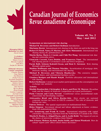
CANADIAN JOURNAL OF ECONOMICS-REVUE CANADIENNE D ECONOMIQUE
Scope & Guideline
Exploring the Depths of Economic Inquiry
Introduction
Aims and Scopes
- Empirical Economic Research:
The journal prioritizes empirical studies that utilize quantitative and qualitative data to draw conclusions about economic behavior, policy implications, and market dynamics. - Theoretical Contributions:
It publishes theoretical papers that advance economic models or frameworks, particularly those that can inform real-world applications and policy decisions. - Public Policy Analysis:
A significant focus on the intersection of economics and public policy, exploring how economic theories and models can be applied to evaluate and improve governmental policies. - International Trade and Economics:
The journal covers topics related to international trade, including trade agreements, tariffs, and the impact of globalization on local economies. - Labor Economics and Market Dynamics:
Research on labor markets, employment patterns, and economic behavior of firms and individuals is a core area, addressing issues such as income inequality and job mobility. - Innovation and Technology Economics:
Exploration of the economic implications of technological advancements and innovation, particularly in relation to productivity and market structures. - Environmental Economics:
The journal contributes to discussions on environmental policies, climate change impacts, and sustainable economic practices.
Trending and Emerging
- Digital Economy and Cryptocurrency:
Recent publications have increasingly focused on the implications of digital currencies and the broader digital economy, highlighting issues like Bitcoin ownership and the economics of cryptocurrency. - Impact of COVID-19 on Economics:
A significant trend has emerged in analyzing the economic impacts of the COVID-19 pandemic, including labor market changes, consumption patterns, and policy responses. - Behavioral Economics and Decision Making:
There is a growing interest in behavioral economics, particularly in how psychological factors influence economic decisions and market outcomes. - Environmental and Sustainability Economics:
Research addressing environmental concerns, sustainable practices, and the economic impacts of climate change has gained prominence, reflecting global priorities. - Inequality and Social Mobility:
Studies focusing on income inequality, intergenerational mobility, and the economic implications of demographic changes are increasingly featured, responding to societal concerns. - Trade Policy and Globalization:
Emerging themes include the analysis of trade policies, the effects of globalization on local economies, and the dynamics of international trade relationships.
Declining or Waning
- Traditional Macroeconomic Models:
There has been a noticeable decrease in papers focusing solely on classical macroeconomic models, possibly due to a shift towards more dynamic and applied approaches. - Purely Theoretical Papers:
The frequency of purely theoretical discussions without empirical backing seems to be waning, reflecting a trend towards integrating theory with practical applications. - Focus on Short-term Economic Fluctuations:
Research centered on short-term economic fluctuations, such as immediate impacts of economic shocks, has become less prevalent, with a growing emphasis on long-term structural issues. - Historical Economic Analysis:
While historical perspectives still hold value, there are fewer studies dedicated to historical economic analysis, as contemporary issues gain more attention.
Similar Journals
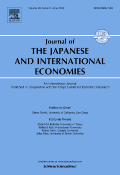
JOURNAL OF THE JAPANESE AND INTERNATIONAL ECONOMIES
Illuminating the Interplay of Local and Global EconomiesJOURNAL OF THE JAPANESE AND INTERNATIONAL ECONOMIES, a prestigious publication from Academic Press Inc. Elsevier Science, has been a vital contributor to the fields of economics, finance, and political science since its inception in 1987. With an impressive impact factor and recognized within the Q2 category for Economics and Econometrics as well as Finance, and Q1 for Political Science and International Relations, this journal serves as a critical platform for peer-reviewed research that influences both academic discourse and policy-making. The journal is indexed in Scopus, evidencing its prominent position within the scholarly community, with notable rankings of #56 in Political Science and #72 in Finance. Authors and researchers are encouraged to submit their work, contributing to the rich tapestry of knowledge surrounding the economic dynamics of Japan and the broader international landscape. Though it does not offer open access, the journal's subscription model ensures a wide dissemination of its impactful articles, making it essential reading for those aimed at deepening their understanding of economic interrelations and current global issues.

Seoul Journal of Economics
Bridging Theory and Practice in Modern EconomicsThe Seoul Journal of Economics, published by the Seoul National University Institute of Economic Research, stands as a significant peer-reviewed platform for advancing scholarship in the fields of economics, econometrics, and finance. As evidenced by its Q2 ranking in the Economics category for 2023, this journal plays a crucial role in disseminating high-quality research and fostering intellectual dialogue amongst scholars and practitioners. With a commitment to bridging theoretical frameworks and empirical findings, the journal covers a diverse array of topics central to modern economic inquiry. While the journal is not open access, it provides vital insights into the rapidly evolving economic landscape in South Korea and beyond, making it a valuable resource for researchers, professionals, and students who seek to enhance their understanding of contemporary economic challenges and methodologies. With its focus on collaboration and rigorous academic discourse, the Seoul Journal of Economics contributes significantly to the global economic knowledge base, encouraging impactful research that influences policy and practice.
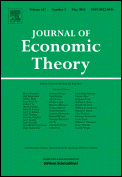
JOURNAL OF ECONOMIC THEORY
Elevating Understanding of Complex Economic ModelsThe JOURNAL OF ECONOMIC THEORY, published by Academic Press Inc Elsevier Science, stands as a paramount platform for disseminating groundbreaking research within the field of economics and econometrics. With an impressive history dating back to 1969 and a convergence period extending to 2024, this journal has continually shaped the academic discourse around critical economic theories and methodologies. Currently recognized in the top quartile (Q1) of its category for 2023, it ranks prominently among its peers, boasting an impactful scholarly contribution reflected in its Scopus ranking—positioned at #348 out of 716 journals in the domain. Although it does not offer Open Access, the journal provides an essential resource for those seeking to enhance their understanding of complex economic models and strategies. Researchers, professionals, and students alike will find the JOURNAL OF ECONOMIC THEORY to be an invaluable asset for their academic and professional pursuits in the rapidly evolving landscape of economics.

Ekonomista
Cultivating rigorous discussions on pressing economic issues.Ekonomista is a distinguished open-access journal dedicated to the field of economics, published by the Polskie Towarzystwo Ekonomiczne. Since its transition to open access in 2022, the journal has enhanced its mission to disseminate high-quality research that serves the academic community and informs policymakers. With an ISSN of 0013-3205 and an E-ISSN of 2299-6184, Ekonomista aims to foster rigorous discussions and innovative perspectives on current economic issues. Although it has experienced lapses in coverage through Scopus, its commitment to advancing knowledge in Economics, particularly in the realms of econometrics and finance, remains steadfast. The journal is indexed within the lower echelons of Scopus rankings, providing an opportunity for new voices in the discipline to emerge and contribute to the ongoing discourse. Positioned at ul. Nowy Swiat 49 in Warszawa, Poland, Ekonomista not only connects researchers and professionals but also serves as an educational resource for students aiming to deepen their understanding of economic theories and practices.
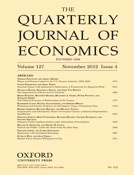
QUARTERLY JOURNAL OF ECONOMICS
Innovative Research for Tomorrow’s EconomistsQUARTERLY JOURNAL OF ECONOMICS is a prestigious and long-established academic journal published by Oxford University Press Inc. With its origins dating back to 1886, this esteemed journal has continually provided a vital platform for the dissemination of cutting-edge research in the field of economics and econometrics. The journal holds an impressive Q1 ranking in the Economics and Econometrics category, positioning it at the forefront of scholarly contribution with a Scopus rank of #2 out of 716, reflecting its standing in the top 1% of the field. Although the journal is not open access, it offers a wealth of vital resources and insights that are indispensable for researchers, professionals, and students alike, as it aims to advance knowledge and influence economic policy and practice through rigorous academic inquiry.
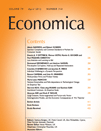
ECONOMICA
Elevating Discourse in Economic Theory and PracticeEconomica is a prestigious academic journal published by Wiley, with a rich history dating back to 1937. Based in the United Kingdom, this journal has established itself as a key resource in the field of Economics and Econometrics, classified in the top quartile (Q1) of its category for 2023. With an ISSN of 0013-0427 and an E-ISSN of 1468-0335, Economica covers a wide array of topics that contribute to the understanding of economic theory and practice, making it essential reading for researchers, professionals, and students alike. Despite being a subscription-based journal, its rigorous editorial process ensures that only the highest quality research is published, further bolstering its impact and influence in the academic community. The journal plays a vital role in advancing economic scholarship by featuring original research articles, critical reviews, and innovative methodologies, promoting discourse among scholars and practitioners.
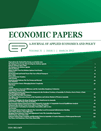
Economic Papers
Innovative Solutions for Contemporary Economic Challenges.Economic Papers is a prestigious journal published by WILEY, recognized for its contributions to the fields of economics, econometrics, and finance since its inception in 1982. With an impressive impact factor reflecting its scholarly influence, this journal is ranked in the Q2 category in the Economics, Econometrics, and Finance sector, placing it among the top 30% of journals in the field. The journal aims to disseminate high-quality research that addresses contemporary economic challenges, thereby advancing both theoretical understanding and practical applications. While currently not available as open access, Economic Papers provides vital insights for researchers, professionals, and students striving to deepen their comprehension of economic dynamics and contribute to sound policy-making. Scholars are encouraged to submit their work to engage with a robust academic community and impact the discourse in economic research.
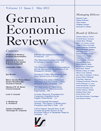
German Economic Review
Championing Quality Research in the Heart of EconomicsGerman Economic Review is a distinguished academic journal published by WALTER DE GRUYTER GMBH, focusing on diverse aspects of economics and econometrics. With its ISSN 1465-6485 and E-ISSN 1468-0475, the journal serves as a vital platform for disseminating high-quality research from both established scholars and emerging voices in the economic field. Housed in the UK, the journal contributes significantly to the academic community, evidenced by its placement in the Q3 category for Economics and Econometrics in 2023 and its Scopus ranking of #381 out of 716, reflecting its impactful presence in the discipline. German Economic Review does not offer open access options; however, its convergence from 2001 to 2024 indicates a long-standing commitment to advancing economic discourse. This journal is ideal for researchers, professionals, and students eager to engage with contemporary economic theories and applications.
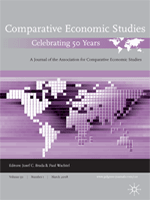
Comparative Economic Studies
Bridging Theory and Practice in Economic StudiesComparative Economic Studies is a prominent academic journal dedicated to the field of economics, published by Palgrave Macmillan Ltd. Now in its converged years from 1996 to 2024, this journal provides a robust platform for innovative research and critical analysis within the economics and econometrics arenas. With an ISSN of 0888-7233 and an E-ISSN of 1478-3320, it has established itself as a vital resource for scholars and practitioners interested in comparative economic analysis, policy evaluation, and theoretical advancements. Recognized for its quality, the journal is classified in the Q3 category in 2023, reflecting its solid standing within the field, with a Scopus rank of 390 out of 716 journals in economics and econometrics. Although it currently does not offer open-access options, the journal is committed to disseminating significant findings that influence policy and scholarship globally. Its well-curated articles play an essential role in shaping contemporary economic discourse, making it an indispensable resource for researchers, professionals, and students alike.
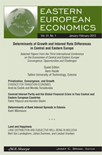
EASTERN EUROPEAN ECONOMICS
Illuminating Pathways in Eastern European EconomicsEASTERN EUROPEAN ECONOMICS is a prominent journal published by Routledge Journals, Taylor & Francis Ltd, dedicated to advancing the field of economics with a focused lens on Eastern European contexts. With an ISSN of 0012-8775 and an E-ISSN of 1557-9298, this journal serves as a vital resource for researchers, professionals, and students interested in the economic dynamics of Eastern Europe. Its publications since 1977, with convergence years spanning from 1982 and ongoing through 2024, illustrate its longstanding commitment to the exploration of economic theory, policy, and practice within the region. Recognized as a Q3 category journal in Economics and Econometrics for 2023 and ranked #402 out of 716 in the Scopus database, it provides a platform for scholarly articles that contribute to the understanding and development of economic strategies in Eastern Europe. While currently not open access, the journal caters to a diverse audience seeking rigorous empirical and theoretical research that addresses the complexities and opportunities within Eastern European economies.